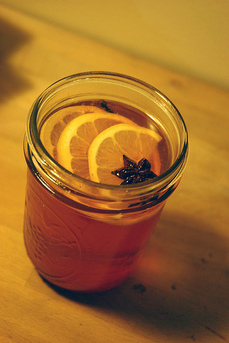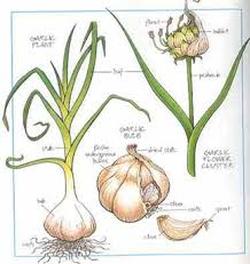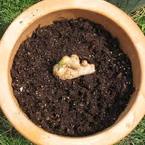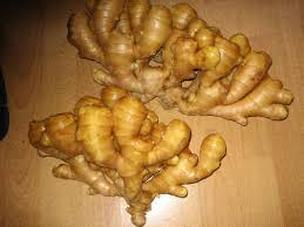
Superfoods and oil of oregano to the rescue!!! number 1 super food in my mind...Garlic!!
with antibacterial, anti viral properties, eating garlic everyday assists the immune system with its never ending scavenger hunt for foreign bacteria and viruses. This is due to the amount of allicin in raw, crushed garlic.
Allicin is an organosulfur compound obtained from garlic a species in the family Alliceae. It was first isolated and studied in the laboratory by Chester J. Cavallito and John Hays Bailey in 1944. (1)When fresh garlic is chopped or crushed, the enzyme alliinas converts alliin into allicin, which gives it it's distinct aroma.

Now it's one of the most studied food remedies in science literature and has been shown to inhibit bacteria that has adapted to standard antibiotic use, or more commonly referred to as antibiotic resistant bacteria (2)
I love to cook with the sulfurous smelly delicious garlic but studies show that cooked garlic may inactivate the enzyme that turns on the allicin and it is not as effective as freshly chopped or crushed cloves.
The best way utilize this amazing plant for its medicinal properties; crush a clove or two with the flat edge or a knife or the heal of your hands, wait 5-10 mins, then add to any food or drink. Sounds gross? I love to add it to my veggie noodle soup, or Thai coconut curry, or mixed with coconut butter over roasted veggies, in salad dressings, rubbed on whole bread dipped in soups ... Adds a bit of flavor without having to go to measures of juicing it (which I will if I have to) but I'm not a huge fan of the garlic orange juice combo.

Growth inhibitors are used to stop garlic from sprouting and can be made from hormones or chemicals. When garlic begins to sprout, the garlic clove loses much of its potency. Growth inhibitors together with gamma irradiation extend the shelf life of garlic.
There's thousands of reasons to buy organic, these are just two..
I personally feel I would much rather use a herb that has been effectively used in human studies for thousands of years, than a drug that has come to market in less than 18 month( average time a new drug takes to get commercially licenced) (4) These are personal choices I make and that that every human/animal should have the right to choose for themselves.
Many people enjoy ginger tea on a regular basis, and this is one of the simplest ways to use it. Simply chop off a couple of inches of ginger root and let it steep in hot water for fresh ginger tea. You can also peel the root using a paring knife and then slice it thinly (or grate it or mince it) to add to tea or cooked dishes. You can't go wrong by adding ginger to stir fries or even your favourite homemade soups. It is a much better mix with fresh juices like carrot and apple, then the beloved garlic.
When left unpeeled, fresh ginger can be stored in your refrigerator for at least three weeks or in your freezer for six months or longer, making it incredibly easy to keep on hand. Try experimenting by adding fresh ginger and other warming spices, like cinnamon, to a cup of tea in the morning, evening, or after a meal… and see if you notice any of the health benefits I've just described. You can even try mixing a teaspoon of organic powdered ginger into a kombucha drink for health potential.
Ginger is commonly used for nausea and the nausea of pregnancy and travel sickness. For gas, colic and irritable bowel. Chills, cold, flu and poor circulation. Menstrual cramps. Dyspepsia (bloating, heartburn, flatulence). Indigestion. Improves circulation. Gastrointestinal problems such as gas or stomach cramps. Lowers cholesterol.
The active ingredient in ginger are called ginerols and are now being extensively studied for their health benefits. To read more about the current research follow the link. http://www.ncbi.nlm.nih.gov/books/NBK92775/

http://chinadailymail.com/2012/05/18/toxic-pesticides-used-to-keep-ginger-fresh/
Other foods and herbs I use on a daily or at least weekly basis are things like Turmeric, used for thousands of years as a blood tonic and anti inflammatory, which comes in handy if you are stuck with inflammation of throat, nasal, bronchial, or intestinal tissue during a cold or flu.
Chillis add heat that help the immune system naturally fight infection. A great circulation booster.
Mushrooms like Changa, and Maitaki have immune boosting properties. The latest study shows that Maitake is an efficient and potent activator of macrophages, key immune cells needed for a healthy immune response. (5)
Drinking freshly squeezed lemon juice or tea helps to restore the body's pH balance. An imbalance of alkalinity creates a condition favourable to the growth of bacteria, yeast and unwanted organisms which thrive in a more acidic environment. This means stay away from added or refind sugars, this also creates an acidic pH!!
When I do feel like I need a little immune boost I increase the amount of these things that are regularly in my diet. I also add oil of oregano, known for it's antibacterial properties. Oregano oil is a powerful antimicrobial, because it contains an essential compound called carvacol. (6)
A whole food diet may not always save the day, unless you think about your whole self, and lifestyle.. Are you getting enough sleep? Too much stress? Not enough movement? All of these attribute to optimal or poor health. One can not be considered without the others. The very same for nutrients, one can not be sufficient for health without the synergistic components of the others.
So eat well, sleep well, think happy and be healthy!
References;
2)April 27, 2012 PubMed PMCID:PMC3418209
Inhibitory effect of Allium sativum and Zingiber officinale extracts on clinically important drug resistant pathogenic bacteria
http://www.ncbi.nlm.nih.gov/pmc/articles/PMC3418209/
3)July 2005, Jane Higdon, Ph.D. Oregon State University; Linus Pauling Institute.
http://lpi.oregonstate.edu/infocenter/phytochemicals/garlic/
4)2014 Health Canada wesite; How drugs are reviewed in Canada
http://www.hc-sc.gc.ca/dhp-mps/prodpharma/activit/fs-fi/reviewfs_examenfd-eng.php
http://www.ncbi.nlm.nih.gov/pubmed/22028332
6) Nov 1 2010, PubMed; Treatment of upper respiratory tract infections in primary care: a randomized study using aromatic herbs.http://www.ncbi.nlm.nih.gov/pmc/articles/PMC2967840/
